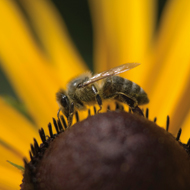Helpful pesticides ‘harmful to bees,’ study concludes

Bees treated with chlorothalonil showed the greatest change in gut microbiome.
Pesticides used to improve the health of honeybees could be damaging the bacteria in their guts, according to new research.
Findings published in the journal Frontiers in Microbiology show that alterations can affect the gut’s ability to metabolise sugars and peptides.
The discovery is a concern for scientists, as these processes are vital for honeybee health.
“Although helpful for ridding hives of parasites and pathogens, the chemicals in beekeeper-applied pesticides can be harmful to the bees,” said lead author Mark Williams, an associate professor of horticulture at Virginia Tech University.
“Our research suggests that pesticides could specifically impact the microbes that are crucial to honeybee nutrition and health.”
In the study, the team observed honeybees that lived in hives treated with pesticides and compared them with those that did not.
Bees treated with chlorothalonil showed the greatest change in gut microbiome, said Williams.
The team now aim to learn how specific changes in gut microbiota affect the survival of honeybees.



 The BSAVA has opened submissions for the BSAVA Clinical Research Abstracts 2026.
The BSAVA has opened submissions for the BSAVA Clinical Research Abstracts 2026.